Pope Francis' recently named 19 new cardinals—half of which hail from non-European countries—to serve the Roman Catholic Church.
Pope Francis

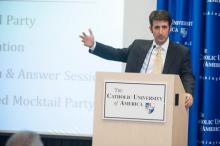
A group of leading Catholic activists and academics has renewed criticism of Catholic University of America over a large gift from the billionaire industrialist and conservative funder Charles Koch, and over a school official’s statements that seem to endorse Koch’s questioning of climate change and the right of public workers to unionize.
In a letter sent on Monday to CUA President John Garvey and Andrew Abela, dean of CUA’s new business school, more than 50 Catholic signatories said Charles Koch and his brother, David, “have a clear political and ideological agenda.”
The Kochs’ libertarian-leaning positions, they said, “are in direct conflict with traditional Catholic values.”
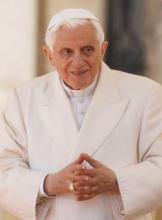
After a tumultuous year that saw the first papal resignation in nearly six centuries, the election of Pope Francis, and a dramatic reshaping of the church’s style and tone, the man who set those wheels in motion has no regrets.
Indeed, Pope Benedict XVI, now retired and living in seclusion inside the Vatican, is at peace in his new role and believes history will vindicate his difficult eight-year papacy, his closest aide said in a rare interview.
“It is clear that humanly speaking, many times, it is painful to see that what is written about someone does not correspond concretely to what was done,” Archbishop Georg Ganswein said in an interview with the Reuters news agency on the anniversary of Benedict’s surprise announcement on Feb. 11, 2013, that he would resign.

As investments go, this was a good one.
A Harley-Davidson motorcycle briefly owned by Pope Francis sold Thursday for $325,000, more than 25 times the Kelley Blue Book resale value for a similar bike.
Chalk it up to the so-called Francis Effect — credited for everything from increased church attendance in Italy to a surge of tourists arriving in Rome from the pope’s native Argentina. Now, evidently, it dramatically changes the value of objects the pope once owned.
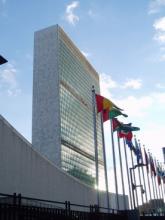
A United Nations panel on Wednesday blasted the Vatican for protecting itself rather than victims of sexual abuse, and it called on the Holy See to create what it called an “independent mechanism” to investigate new charges of abuse.
The 16-page report from the Committee on the Rights of the Child accused the Vatican of “systematically” adopting policies that allowed priests to rape and molest thousands of young people over a span of decades. It also calls on the church to remove known or suspected abusers from its ranks immediately.
“The Committee is gravely concerned that the Holy See has not acknowledged the extent of the crimes committed, has not taken the necessary measures to address cases of child sexual abuse and to protect children, and has adopted policies and practices which have led to the continuation of the abuse by and the impunity of the perpetrators,” the report said.
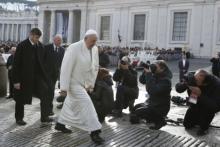
Did you hear that Pope Francis plans to call a Third Vatican Council? Or that he uncovered previously unknown Bible verses? Or that he sees the story of Adam and Eve as just a fable?
Here’s the problem: None of it is true.
Still, that didn’t stop these and other stories from ricocheting around the Internet and, in some cases, even in traditional news sources. Among the dozens of other fake pope stories are claims that he called hell a literary device and that he believes all religions are equally true.
The tide of fake pope stories has risen so fast in recent months that the Pontifical Council for Culture issued a stern warning on its Facebook page.

Jesus was quite clear that our allegiance was to be with the POOR, not the barons of Wall Street.
God's laws are immutable Gravity. Aging. Those sorts of things. We cannot change them. But we DO know that mere humans MADE UP the laws of the market economy and we don't have to follow its rules. We can choose to, but it’s a choice.
The rules that run our capitalistic system were invented by us. And we really do not have to play by those rules.
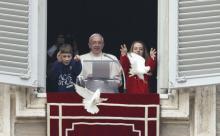
After two doves released by Pope Francis and two young children were attacked by aggressive predator birds, a leading animal rights group called on the pontiff to stop what they called “outdated traditions.”
The Vatican regularly releases doves as a symbol of peace, and in multiple instances they have been chased and sometimes captured and killed by more aggressive fowl in the area. But Sunday’s events were more noteworthy because the scene of a seagull and a crow swooping in to attack the doves was captured by several of the photographers in St. Peter’s Square as a crowd of tens of thousands — including several thousand children — looked on.
Both white doves managed to escape their predators after a brief tussle, but it’s unclear what ultimately happened to them.

Overheard on a Facebook conversation last week: “There is really not much difference between compassion and pity when it comes to being on the receiving end of it.” This thought gave me pause as I consider compassion to be a central tenet of biblical justice, and yet, I experience this to be true. We use the fancy spiritual term of “compassion” when the gist of the sentiment is, indeed, pity.
The above conversation rose out of a discussion on the viral story of Pope Francis kissing the disfigured man. The media reporting the story highlights the compassion of the Pope, how his actions are pushing outside the box of the papacy, and how revolutionary his love was. Other than a brief medical description of the disfigured man’s disease, there is no additional information on who he is, where he lives, or whether he has a family. We are not even given his name. The buzz generated by this story arises out of an awed respect for someone who could even consider touching such a pitiful, nameless person. I can’t help but wonder how this man feels to have the world captivated by somebody showing love to himself. It seems to me his deformity has been made into a public spectacle.
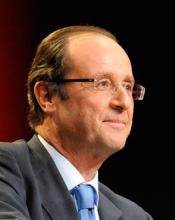
French President Francois Hollande, embroiled in a controversy surrounding an alleged affair with an actress, met Friday with Pope Francis, who was unusually somber in his public appearance with the scandal-scarred French leader.
There was no official comment about what the two men discussed in their private 35-minute meeting, but the pontiff — known for his friendly and informal style — appeared more stern and serious than usual as he sat across an ornate desk from Hollande.
Hollande has earned headlines across France and beyond for his alleged affair with actress Julie Gayet. The allegations sparked so much fury that French first lady Valerie Trierweiler had to be admitted to the hospital.
The jury is still out on whether the audience with the popular pontiff would help repair Hollande’s tarnished image at home.
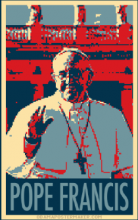
The news that President Obama will meet with Pope Francis on March 27 brightened a snowy Tuesday morning for Catholics who see a broad overlap between the president’s agenda and the pontiff’s repeated denunciations of income inequality and “trickle down” economics, and his support for the poor and migrants.
Other Catholics, especially conservatives already unsettled by Francis’ new approach, hoped that the pope would use the encounter at the Vatican to wag a finger at Obama over the president’s support for abortion rights and gay marriage.
So what will the two leaders talk about? What issues will they avoid? With Francis, anything is possible, but here are some initial ideas on how the summit could play out:

In naming his first batch of new cardinals on Sunday, Pope Francis made some surprising choices that largely confirmed the characteristics he wants in the Catholic Church he leads: a greater focus on the poor, a bigger voice for the Global South and a reduced emphasis on the traditional hierarchical perks.
True to form, Francis wrote each of the new cardinals and stressed that the new title “does not imply promotion.” He asked them to refrain “from any expression of worldliness or from any form of celebration contrary to the evangelical spirit of austerity, sobriety and poverty.”
Some had expected Francis to leave his mark by pushing well beyond the ceiling of 120 cardinals under the age of 80 who are eligible to vote in a conclave.
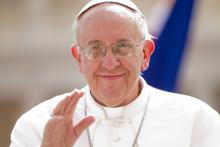
As the New Year brings reflection over the past year, we have heard much about Pope Francis and the ways he has surprised Catholics and non-Catholics alike. The suddenness of his predecessor’s resignation this past spring, the fact that he is the first Pope from the Americas, and his apparent commitment to his namesake St. Francis’ concern for the poor and displaced all contribute to the sense that this Pope embodies the unexpected.
Especially indicative of the way this Argentinian, who for a short time was a nightclub bouncer, has surprised people is being named “Person of the Year” by The Advocate, a popular U.S. magazine devoted to gay and lesbian rights, culture, politics, and entertainment. Although he did not (nor will he, likely) reverse the Church’s stance on gay marriage, this accolade was given to the Bishop of Rome based upon his apparent change in tone about gays and lesbians, reportedly having said to reporters, “Who am I to judge?” when asked about the issue. Clearly, this humble response has endeared the Pontiff to many who have been excluded from the fold, yet still yearn for hints of acceptance.
The period of Epiphany is a time in which the identity of the Divine’s chosen is revealed and often this identity entails some element of surprise. In the same vein, this week’s Old Testament text, Isaiah 49:1-7, highlights the unforeseen nature of the servant who restores Israel.
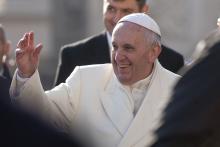
"Preach the Gospel at all times, and if necessary, use words" is a quote widely attributed to St. Francis of Assisi. It also seems to be the motto of Pope Francis. Instead of just talking about abstract doctrines, he consistently lives out his beliefs in public ways that have grabbed the world's attention. His example of humility, compassion, and authenticity resonate powerfully in Washington, where cynicism is rampant, pride remains even after the proverbial falls, and an ideology of extreme individualism has overtaken a significant faction within our politics.
The Pope's words and deeds fascinate us because they are genuine and selfless. How could a leader of global significance spend time cold calling pregnant women in distress, kissing the feet of young Muslim inmates, or embracing a disfigured man? What sorts of values motivate such behavior? These stories touched our hearts, but they appeared irrelevant to our politics.
Then the Pope started talking about our wallets, which, according to a several commentators on the far right, instantly transformed him into a threat to capitalism itself.

No doubt about it, Pope Francis is generating the kind of Internet buzz and sky-high Q Scores that brand managers can only dream of. But is the pontiff becoming a victim of his own good press?
The Vatican once again had to dispel media reports that went well beyond what Francis actually said, as his spokesman formally denied that the pope had signaled an openness to same-sex unions in a recently published conversation with leaders of religious orders.
During the November discussion with leaders of the Jesuits, Franciscans and others, Francis said they needed to engage “complex” situations of modern life, such as the prevalence of broken homes and the growth in gay couples rearing children.

Jesus was breast-fed.
It’s a point often made by mothers who want to breast-feed in church, but know others would prefer that they retreat to the nursery, or find an out-of-the-way bench. Another point they make: Breast-feeding is part of God’s plan — so of all places, why not in church?
“Breasts were made to feed a baby,” said Misti Ryan, a devout Christian lactation consultant in Texas whose business has a cross in its logo.
A mother can breast-feed modestly and should be allowed to nurse in church if she wants to, said Ryan, who has nursed five children in her Baptist congregation. “The church needs to go there.”
Pope Francis did go there last month, in his much-noted comment to a journalist about a young mother and infant who had come to a recent general audience:
“She was shy and didn’t want to breast-feed in public, while the pope was passing,” Francis recalled. “I wish to say the same to humanity: Give people something to eat! That woman had milk to give to her child; we have enough food in the world to feed everyone.”

One of my favorite quotes of 2013 comes from Pope Francis. Asked what he would say about a member of the Catholic clergy who is gay, he responded with a question of his own.
“Who am I to judge?” Francis replied.
A good question for all of us, no?
Our world is inundated with judgment. Social media can be a swamp of it. Recently, a television celebrity was judgmental about those who are different from him and got in trouble for it. Many defended his judgmental attitude and words.
Which raises some important questions for all of us: Is it good to be judgmental? Isn’t life about making judgment calls and living by our values? Aren’t we all judgmental in some ways?
We all make judgments every day, decisions about what we think is best to do in the various circumstances of our lives. We might see someone in need and decide to help. We might recognize one of our shortcomings and decide we’ll change. We might run into an unforeseen challenge and try to figure out the best way to respond.
That’s all well and good.
Being judgmental is a very different thing.

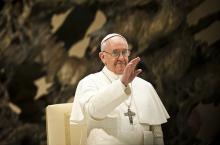
Pope Francis, in his message for the World Day of Peace on Jan. 1, stresses the concept of fraternity as the basis for a moral economy, moral society, and moral relationships among nations.
A longing for fraternity, the pope argues, lives within every human heart.
In the heart of every man and woman is the desire for a full life, including that irrepressible longing for fraternity which draws us to fellowship with others and enables us to see them not as enemies or rivals, but as brothers and sisters to be accepted and embraced. Fraternity is an essential human quality, for we are relational beings. A lively awareness of our relatedness helps us to look upon and to treat each person as a true sister or brother; without fraternity it is impossible to build a just society and a solid and lasting peace.
Too often, Pope Francis explains, this human desire for fraternity has been undermined by other human inclinations, those of selfishness, envy, and greed. He argues that those inclinations form a poor foundation for human societies and economies, and that we must build a foundation for society and the economy based on the “transcendent dimension” of humanity:
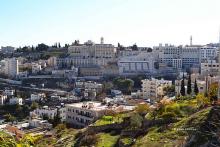
Christmas is the one time each year when much of the world turns its gaze to Bethlehem, the West Bank town at the heart of the Gospel account of Jesus’ humble birth in a stable.
But Bethlehem may be in for a second round of global publicity in the span of a few months with the expected visit of Pope Francis in May.
In an interview earlier this month, Francis confirmed rumors that he planned to travel to the Holy Land — probably stopping at sites in Jordan, Israel and the West Bank in the Palestinian territories — and said preparations were underway.
Then last week the Latin patriarch of Jerusalem, the top Catholic official in the region, revealed that the visit was set for May.
Given the political and religious combustibility that attends almost any event in the Holy Land, a papal trip was bound to be fraught and a debate over the visit quickly erupted as Israeli newspapers reported that the preliminary itinerary for Francis’ pilgrimage has him spending just one full day in Israel proper — probably arriving in Jordan on Saturday, May 24, traveling to Israel on Sunday morning, then celebrating Mass in Bethlehem on Monday before heading back to Rome.